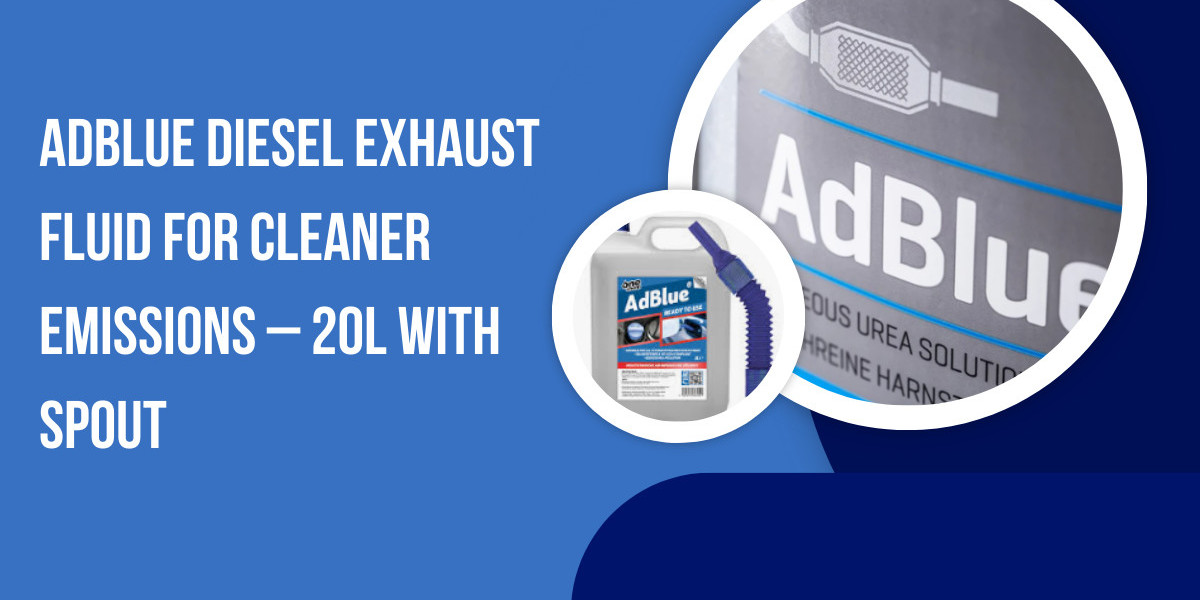As environmental concerns grow, industries are seeking ways to reduce harmful emissions. One critical solution for diesel vehicles is AdBlue, a specially formulated liquid that significantly reduces nitrogen oxide (NOx) emissions. Used in conjunction with Selective Catalytic Reduction (SCR) technology, AdBlue has become essential for modern vehicles meeting stringent environmental regulations.
This guide delves into everything you need about AdBlue, including its purpose, application, and importance in the automotive and transportation sectors. Whether you're a fleet manager, diesel vehicle owner, or simply curious, this article answers your questions in an engaging and easy-to-understand format.
What Is AdBlue?
AdBlue is a high-purity urea solution mixed with deionized water, commonly used in diesel vehicles equipped with SCR technology. When sprayed into the exhaust system, it reacts with NOx gases, converting them into harmless nitrogen and water vapor. This process significantly reduces air pollution, making diesel engines more environmentally friendly.
How Does AdBlue Work in Diesel Engines?
Purpose: AdBlue works with SCR technology to clean harmful emissions from diesel engines.
Process: After combustion, NOx gases pass through the SCR system, where AdBlue is injected. The chemical reaction transforms toxic pollutants into non-harmful byproducts.
Outcome: Cleaner emissions that comply with Euro 6 and other stringent environmental standards.
This straightforward mechanism is a game-changer for reducing diesel-related pollution.
Why Is AdBlue Important?
Environmental Impact: Diesel vehicles are notorious for their NOx emissions, which contribute to smog and respiratory issues. AdBlue mitigates these effects.
Compliance with Regulations: Governments worldwide mandate using technologies like SCR to meet emission standards. Vehicles using AdBlue easily comply.
Extended Engine Life: AdBlue can improve its overall performance and lifespan by reducing harmful deposits in the engine.
Who Needs AdBlue?
Commercial Fleet Operators: Most heavy-duty trucks and buses require AdBlue.
Private Diesel Vehicle Owners: Modern diesel cars, SUVs, and pickup trucks often have SCR systems.
Off-Highway Equipment: Agricultural and construction machinery also uses AdBlue for emission compliance.
Ensuring the availability of AdBlue is vital for these industries to maintain operations and meet legal requirements.
AdBlue Consumption: How Much Do You Need?
AdBlue consumption averages about 1-2 liters per 1000 kilometers.
It accounts for approximately 5% of diesel fuel consumption.
A 20-liter AdBlue container typically lasts several months for private vehicles.
Heavy-duty vehicles may require larger quantities depending on their usage and load.
Does AdBlue Affect Vehicle Performance?
Contrary to myths, AdBlue doesn't interfere with engine performance. Instead, it enhances the efficiency of the emission system. Regular use ensures compliance with environmental laws without impacting mileage or power.
Signs Your Vehicle Needs AdBlue
Most vehicles have dashboard warnings to indicate when the AdBlue tank is low. Ignoring these warnings could result in reduced engine performance or failure to start. Always keep spare AdBlue on hand for emergencies.
How to Refill AdBlue?
Refilling AdBlue is a straightforward process:
Locate the AdBlue tank, often marked with a blue cap.
Use a compatible container or pump to avoid contamination.
Fill carefully to prevent spills, as AdBlue is mildly corrosive.
Where Can You Buy AdBlue?
AdBlue is widely available at:
Gas stations.
Automotive supply stores.
Online retailers.
Always ensure you purchase high-quality AdBlue certified by the ISO 22241 standard.
Myths About AdBlue Debunked
It's just water: No, AdBlue is a specific urea-water solution essential for SCR systems.
It's harmful to the vehicle: AdBlue poses no risk to engines when used correctly.
It freezes in cold climates: While it can freeze, most vehicles have built-in heaters to address this issue.
Environmental Benefits of Using AdBlue
Reduces NOx emissions by up to 90%.
Helps meet global climate goals.
Promotes cleaner air in urban areas.
According to the International Council on Clean Transportation, NOx emissions reductions through SCR systems are critical in combating air pollution.
Cost-Effectiveness of AdBlue
The average cost of AdBlue is relatively low compared to its environmental benefits.
Bulk purchasing options can save fleet operators money.
Using AdBlue ensures compliance, avoiding costly fines.
How to Store AdBlue Safely
Proper storage prolongs the shelf life of AdBlue:
Could you keep it in a cool, dry place?
Avoid exposure to direct sunlight.
Use within 12 months of purchase for optimal performance.
Common Problems with AdBlue and Their Solutions
Crystallization: Ensure the cap is tightly closed to prevent evaporation.
Contamination: Always use clean equipment to refill.
Freezing: Store AdBlue at temperatures above -11°C.
Future Trends in AdBlue Usage
As emission standards become stricter, the demand for AdBlue is expected to rise. Innovations in SCR technology may further optimize AdBlue consumption, making it even more effective in reducing pollution.
What Experts Say About AdBlue
"AdBlue has transformed diesel engines into cleaner machines without compromising performance," says a leading automotive engineer, Dr. Alan Moore.
FAQs
What happens if I run out of AdBlue?
Running out of AdBlue often limits your vehicle's performance; sometimes, it will start when refilled.
Can I use water instead of AdBlue?
No. Only certified AdBlue should be used, as water lacks the necessary chemical properties.
Is AdBlue harmful to the environment?
AdBlue is non-toxic and biodegradable, posing no significant environmental risks.
How do I know when to refill AdBlue?
Dashboard indicators typically alert you when levels are low.
Can AdBlue go bad?
Yes, improper storage can degrade its quality. Follow storage guidelines to maintain effectiveness.
Does AdBlue improve fuel economy?
While it doesn't directly improve fuel economy, AdBlue ensures cleaner emissions, which may indirectly enhance overall engine performance.
Conclusion
AdBlue is a simple yet effective solution for reducing emissions from diesel engines. Its affordability, ease of use, and significant environmental benefits make it indispensable for modern vehicles. By embracing AdBlue, we step toward cleaner air and a sustainable future.









